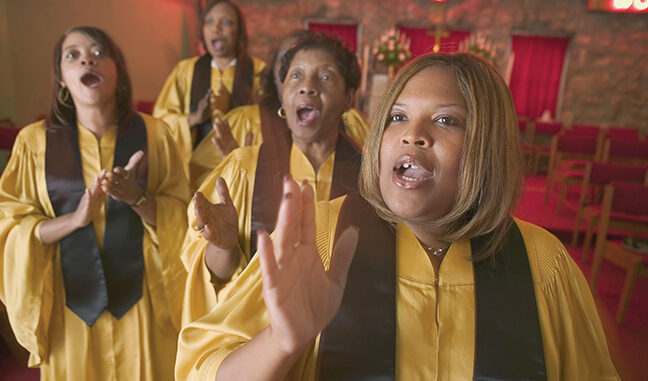
If we were to visit the city of Halle in central Germany, we would find a bustling community of nearly 250,000. Founded in 806 A.D., Halle is brimming with history. Near its center is a cream-colored three-story building known as Handel-Haus (Handel’s House). This is where Georg Frederic Handel was born on February 23, 1685.
While the Handel-Haus structure in Halle may date back as far as the 15th century, there is another “Handel House” in central London which is of much later origin. In this museum we learn that father Georg wanted son Georg Frederic to study law, but music held sway. As a boy, Handel had to sneak up to the attic to play a clavichord that had been hidden up there. Handel’s first public performance took place at age eleven. His career as world-famous performer and composer was launched.
Handel found London, the teeming city that it was, to be a place of increased opportunity. His London address was 25 Brook Street. It was to be Handel’s House for the next 49 years.
Today the three-story multi-unit brick structure is called the Handel & Hendrix House, because the American rock star Jimi Hendrix lived for a short period in the 1960s, at 23 Brook Street, right next door to Handel’s house. Separated by a wall and 200 years are the homes of two musicians who chose London and changed music.
Handel had an intimidating physique. He never married, but he was “pursued by singers and by young women, and a special Italian soprano.” Handel was such a popular opera composer that he was allowed to pick his own leading ladies. However, this practice led to a dispute between two rival singers of the day who ended up by “making a scrap” on stage during a performance. They both had to be dragged off stage.
His life, and career, nearly came to an early and sudden conclusion in 1704 during an altercation at the age of nineteen with fellow composer Johann Mattheson for reasons apparently unknown. The two had a fierce quarrel during which Mattheson almost killed Handel. It came to a duel. Mattheson’s sword fortunately struck a button on Handel’s chest rather than the chest itself.
Handel had his share of health issues. He became increasingly obese, suffered a stroke, was involved in a coach crash, had cataracts and went blind for a time after a botched eye operation.
At age 74, sightless and in failing health, Handel insisted on attending an April 6 performance of Messiah at the Royal Theatre in Covent Garden. Eight days later, Handel died at home. 3,000 attended his funeral. This year marks the 250th anniversary of his passing.
Messiah
Messiah was originally an Easter offering. It was premiered on the Musick Hall stage in Dublin, not London, in April 1742. Why Dublin? Jonathan Kandell writing in Smithsonian Magazine suggests two reasons – Dublin’s growth and vibrant market, and Handel’s own disappointment over recent small audiences in London.
The Dublin crowds were huge. They came in record numbers. Management pleaded that the ladies wear dresses without hoops and gentlemen come without their swords in order to “make room for more company.”
Another reason for choosing Dublin for the Messiah opening night can be found some two centuries later in a certain practice that developed on New York’s Broadway. Not knowing how big or small their crowds would be, producers along the Great White Way began to try out their new musicals in places like New Haven, Detroit and Columbus first before Broadway. Likewise, Handel chose to make the tiring voyage from England to Dublin to try out Messiah before staging it in London.
Writer Ricky O’Bannon points to some other interesting facts about Handel’s Messiah.
A lot of people thought it was blasphemous. Given the oratorio’s sacred subject matter and Handel’s note on his original manuscript that read “to God alone the glory,” it’s hard to imagine that any audience could have interpreted the music as anything less than devout. Handel advertised the work as a “sacred oratorio.”
Handel wrote the original version of Messiah in three to four weeks. Some musicologists say the composer spent only 24 days writing the oratorio. “What makes this even more astounding,” writes O’Bannon, “is the sheer scale… The score takes up 259 pages… There are remarkably few mistakes.” NPR music commentator Miles Hoffman estimates there are a quarter of a million notes in Messiah.
“An often repeated legend about Messiah,” writes O’Bannon, “is the story of King George II who was so moved by the ‘Hallelujah’ chorus during the London premiere of Messiah that he rose to his feet and then everyone in the hall followed suit so as not to be sitting when the king was standing.”
And so we stand when we come to the “Hallelujah” chorus, whether the King George story is truth or delightful legend. We don’t really know whether or not King George II was even there. For instance, in their reporting, why did the journalists in attendance seem to overlook a royal presence?
Handel’s fondness of the work is well known. He devoted himself to the project by day and far into the night. Handel declared receiving heavenly inspiration while composing, and that he at times witnessed the presence of angels. Messiah is divided into three parts: Part One sets to music the prophecies of ancient Old Testament prophet Isaiah promising the birth of the long-awaited Jesus the Christ. Part Two exalts His atoning sacrifice for humankind, and Part Three heralds His ultimate resurrection.
Abroad, Beethoven himself, citing Messiah, called Handel the “greatest composer that ever lived.” Handel’s reputation – and that of his best-known creation – only continued to expand. Mozart paid Handel the supreme compliment of reorchestrating Messiah in 1789. Even Mozart, however, confessed himself to be humble in the face of Handel’s genius. He insisted that any alterations to Handel’s score should not be interpreted as an effort to improve the music. Said Mozart, “Handel knows better than any of us what will make an effect.”
-by Lee Stott
About the Author: Lee Stott is retired from WKU Public Radio, lives near Franklin with his daughter Cindy Wade’s family and has 30 grandchildren and seven great-grandchildren.





